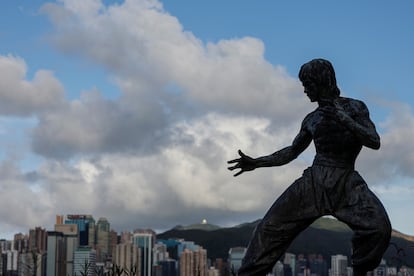Fans of martial arts legend Bruce Lee fondly remember his life philosophy 50 years after his death
Lee was famous for his martial arts talent and his fight against racist portrayals of Asians on big and small screens in the 1960s and 70s

Fans of late martial arts legend Bruce Lee, who broke negative stereotypes around Asian men in films, gathered in Hong Kong this week to commemorate their idol’s death half a century ago, remembering his legacy and his life philosophy on persistence.
Lee, who was born in San Francisco but raised in the Asian financial hub, was famous for his martial arts talent and his fight against racist portrayals of Asians on big and small screens in the 1960s and 70s. He died at the height of his fame due to an allergic reaction to painkillers when he was 32.
The 50th anniversary of Lee’s death on Thursday drew fans to exhibitions in Hong Kong on his life and career. They also laid flowers at his statue at the Avenue of Stars, a tourist attraction modeled on the Hollywood Walk of Fame on the Kowloon shore of Victoria Harbor.
A government-run museum organized a camp for students to learn about Lee’s legacy by introducing them to Jeet Kune Do, the martial arts style that Lee invented and practiced. The museum also screened his films.
Many of Lee’s supporters said his philosophy inspired them since they were young, even though many only learned about him and his works after his death.
Sophie Uekawa, a translator, said she was initially attracted to Lee’s muscular body and smooth moves on TV. But she was later impressed by his words, including about how unhappy circumstances eventually pass. When Uekawa was bullied by schoolmates in secondary school, Lee’s quotes helped her endure feelings of helplessness.
“It can be said that he is my savior,” Uekawa said.
Lee began his career as a child actor in the 1940s and started learning Chinese kung fu when he was 13. He moved back to the U.S. in 1959 and studied philosophy at the University of Washington.
The superstar fought hard against racist stereotypes in the U.S. entertainment industry where Asian men were often portrayed as servants, unskilled workers or evil geniuses in Hollywood.
Lee eventually went back to Hong Kong and made hits like “The Big Boss” and “Fist of Fury.” His last film, “Enter the Dragon,” was released six days after his death and became his most popular movie. He was one of the first Asian actors to attain Hollywood megastardom and fanned a kung fu craze that swept the world.
On Thursday, W Wong, the chairperson of a Bruce Lee fan club in Hong Kong, was touched to see fans from different countries including Britain and Korea gathering at Lee’s statue to pay tribute to him.
But Wong said demographics of the club established nearly three decades ago are changing as members grow older and that it has only one member in his 20s.
“We face problems in passing on our work,” Wong said, although the group still has some 600 members.
An instructor at a martial arts institute in Hong Kong’s Jordan district says more than half of the studio’s Jeet Kune Do students came to learn the martial arts style because of Lee.
Teacher Ricky Fong said adaptability is important in Jeet Kune Do and life and pointed to one of Lee’s most famous sayings: “Be water, my friend.” The phrase was frequently used by protesters in Hong Kong’s 2019 pro-democracy movement to describe their guerrilla strategy of moving fluidly across the city.
One of Fong’s students, Adrian Li, said he admired Lee’s martial arts skills and philosophy. He added that Lee’s eagerness to keep learning has influenced him deeply.
“Not be bounded by anything. One can learn a lot,” he said.
Sign up for our weekly newsletter to get more English-language news coverage from EL PAÍS USA Edition
Tu suscripción se está usando en otro dispositivo
¿Quieres añadir otro usuario a tu suscripción?
Si continúas leyendo en este dispositivo, no se podrá leer en el otro.
FlechaTu suscripción se está usando en otro dispositivo y solo puedes acceder a EL PAÍS desde un dispositivo a la vez.
Si quieres compartir tu cuenta, cambia tu suscripción a la modalidad Premium, así podrás añadir otro usuario. Cada uno accederá con su propia cuenta de email, lo que os permitirá personalizar vuestra experiencia en EL PAÍS.
¿Tienes una suscripción de empresa? Accede aquí para contratar más cuentas.
En el caso de no saber quién está usando tu cuenta, te recomendamos cambiar tu contraseña aquí.
Si decides continuar compartiendo tu cuenta, este mensaje se mostrará en tu dispositivo y en el de la otra persona que está usando tu cuenta de forma indefinida, afectando a tu experiencia de lectura. Puedes consultar aquí los términos y condiciones de la suscripción digital.








































